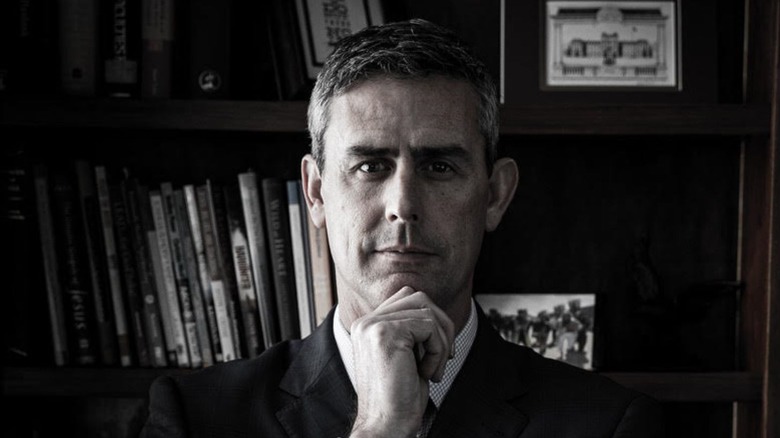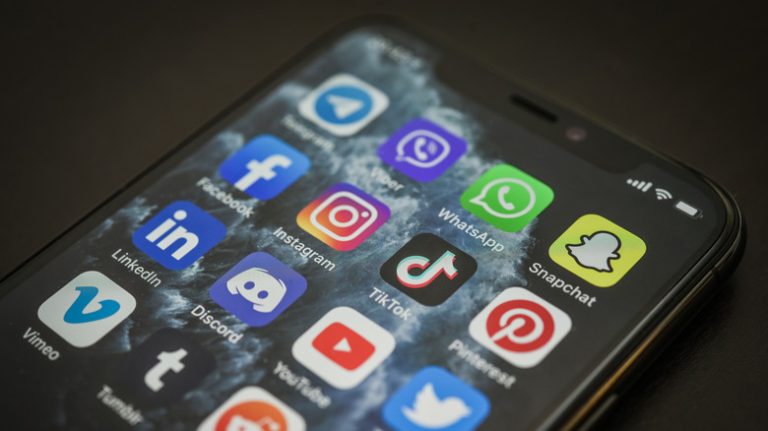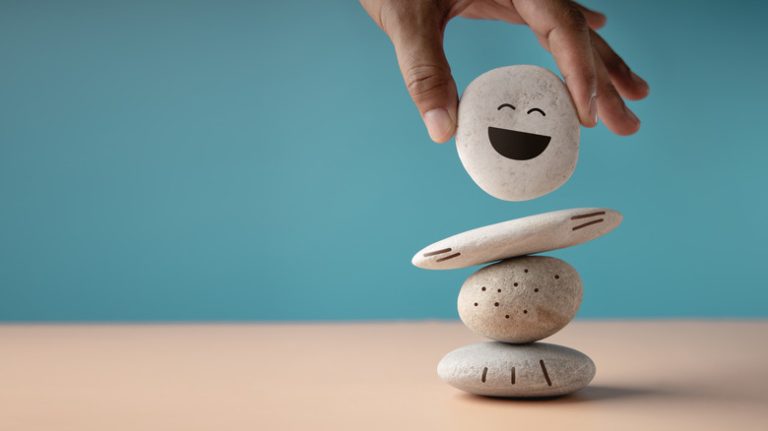Dr. Jarrod Spencer, a sports psychologist and the founder of Mind of the Athlete, has made it his mission to change the conversation about the health of elite athletes. His goal? To create a world where elite athletes focus on their mental health as much as they focus on their physical health.
Spencer works with several collegiate and professional sports team to create a training environment where mental health is just as important as physical health. He also works one on one with athletes competing at the highest levels of their sports to ensure that they’re mentally prepared for training, competition, and a life in the spotlight.
Spencer’s work goes far beyond the locker room as well. Through his books, speaking engagements, and consulting work, he helps to educate the public about the emotional and psychological challenges faced by elite athletes. In 2024, Spencer partnered with Mondo Cares to make a documentary on the subject called “I’m Fine, (Not) Really.”
In an exclusive interview with Health Digest, Dr. Spencer talked about his work with elite athletes, the documentary, the relationships between elite athletes and their fans, and why it’s so important for athletes to prioritize and be transparent about their mental health.
Valuing mental health as much as physical health
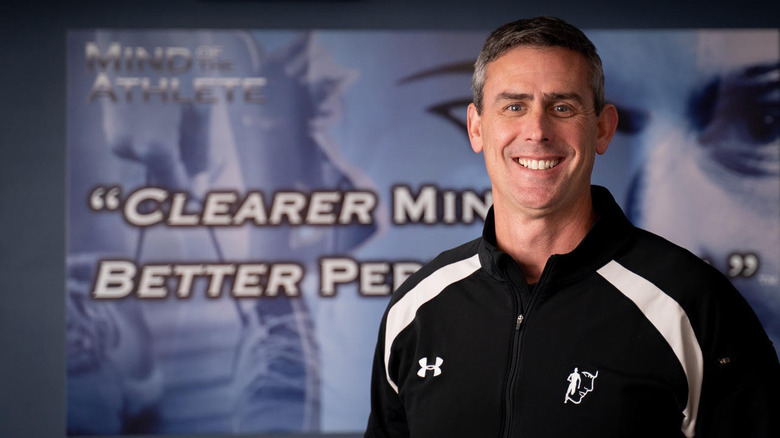
Can you give us more information about sports psychology and what your work focuses on?
Well, the nature of the work that I really focus on is two sides of the same coin. One side is mental health, right? As a licensed doctorate-level sports psychologist, I really focus on anxiety, depression, how we’re dealing with stress, insomnia. The other side of the coin is really high performance. How do we win? How do we thrive? How do we accomplish those goals, and what are the mental skills to do that? So I really focus on both sides of the same coin.
How did you get involved in the documentary “I’m Fine, (Not) Really”?
Well, during the pandemic I had done a little work with Mondo, and was really impressed with the people of Mondo. And so from that experience, and of course how they value the mental side of sports, when this documentary came up I was that person that they turned to, and I was really grateful because of just the respect I have for what they’re doing.
Social media and athlete mental health
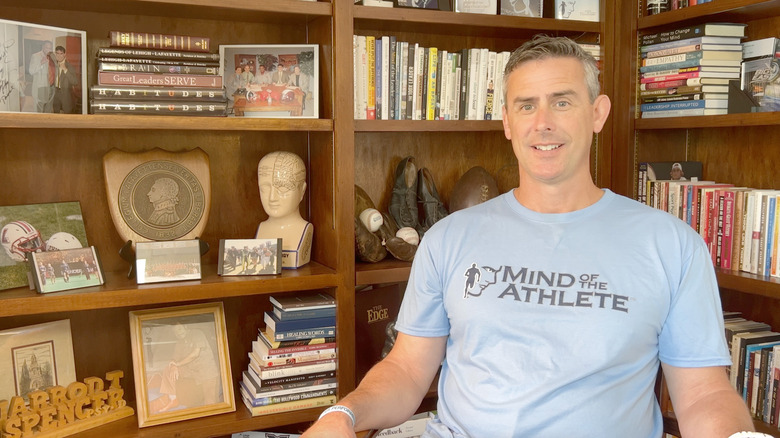
For those who don’t know about the documentary, it focuses a lot on the mental health of elite athletes, especially through the lens of social media and fans. How do you think that social media is impacting the mental health of elite athletes?
Well, despite every elite athlete’s best efforts to try to limit their exposure to some of the negativity that people have access to with their comments, it does impact an athlete. And particularly, at the end of the day, when people lie in bed, and they maybe scroll through social media, they may inadvertently see something that they didn’t want to see. And so it does get through some of our filters, especially when the athlete’s tired, or fatigued, or injured, or overextended, or overwhelmed. Just like the rest of us. And so when those negative thoughts get through it can spike a little anxiety, or anger, or agitation. And just like a drop of water hitting a rock, it doesn’t seem like a big deal, but after a lot of drops it starts to decline.
And do you think that it’s impacting their physical health as well?
Well, emotional stress manifests itself in physical symptoms. And so anytime an athlete is sleep deprived, for example — maybe they have some insomnia due to some psychological stressors that they’re going through — we know that there’s an increased chance of injury. So we do know that psychological stress manifests itself in physical symptoms.
The changing relationship between fans and athletes
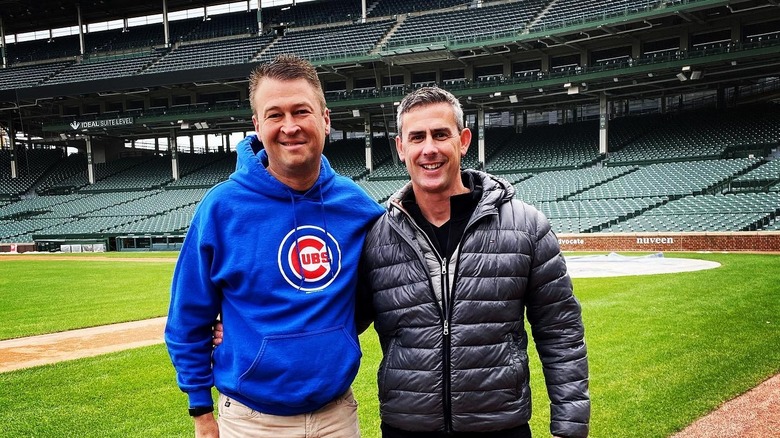
From the work that you did with Mondo, and your work with athletes, how do you think social media has changed fans’ relationships with athletes, and the expectations they have of athletes?
Well, certainly from a fan’s perspective, it’s kind of fun! Because if we go on Instagram, for example, we might be able to send them a direct message and hope that maybe they might see it. Or we could comment and maybe every once in a while they might like that comment, and that makes us feel a connection a little bit more to the athlete. And so in some ways that’s good, that’s healthy, that’s fine. It’s just when it takes that devious turn where it becomes counterproductive that it’s not good for the fan nor the athlete.
What do you think is the impact of that on the athletes?
Well, it chews up minutes, quite frankly. We all have the same number of seconds in a day. And unfortunately, when you’re spending some of those seconds trying to be a good athlete and a good person by responding to social media, sometimes it can just chew up seconds and minutes that we really don’t have to give at that particular moment. And so in their lives, well, what’s the cost? Oftentimes the cost is sleep. And sleep is the number one factor in performance. So we can’t compromise sleep.
But when we give up those seconds for social media … I mean, the average person I’m talking to right now in the athletic world, unless they’re a real high, elite-level athlete, it’s about six hours a night of sleep and about six hours of social media a day. That’s crazy! And many young athletes I work with are actually logging more hours of social media than they are hours of sleep. I mean, it’s crazy. So where does it get us? It gets us in the sleep.
The film brings up the very interesting question of what elite athletes owe their fans. What do you think about this?
Well, it’s changing, right? I mean, every generation of athletes has a different type of dynamic going on with their fans. So right now we’re in a place in society where, with so many people having so much more screen time, and the media aspect of sports being so much more prominent, we’ve got to figure this out. And quite frankly, I don’t think we have the answers just yet. If we had the answers we wouldn’t be dealing with the problem. But I think we have to figure this out. I know a lot of teams do great social media training, and they try to equip their athletes with skills to kind of manage some of these complexities. But I think we’re just scratching the surface.
I think this is going to go much deeper. Because I think … and the documentary did a wonderful job of kind of touching on this, what’s happening here is mental health. Where is this all going? And the documentary does a wonderful job of showing that at the end of the day, this is impacting the thoughts and the feelings of the athletes. And it is oftentimes happening in a way that’s even much more than they can bear.
Mental health struggles are ‘invisible injuries’
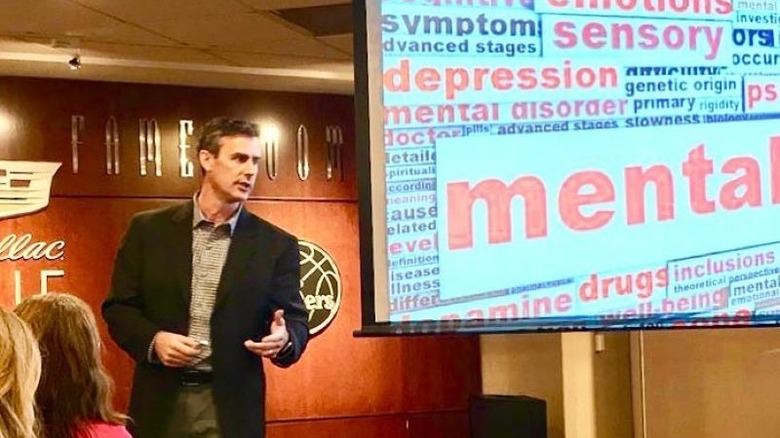
In the film you talk about mental health as an “invisible injury.” Can you tell us more about that concept and what you mean by that?
Sure. Yeah. When Naomi Osaka stepped out of the French Open, I did a little interview on CNN New Day. And what I said in that interview was that, had she stepped out because of a physical injury, like a knee injury, they would’ve given her a pass for, maybe, that requirement. But in this particular case here, because it was an invisible injury, and oftentimes mental health is an invisible injury, we tend to not give that kind of empathy, or that pass, that sometimes we really do need.
And so a lot of us struggle with mental health in the world, but we might not show it because we put on the face, and we say the right things, and we present the right way. Or athletes, for example, just physically they may look very attractive because of their physique, but the reality is that just below that physique is a person who’s really struggling with some clinical depression. And again, the film did a wonderful job of showing that you can’t judge a book by the cover.
With the people that you’ve worked with, and your years of experience in this, why do you find that so many elite athletes struggle with anxiety and depression?
Well, we haven’t done enough to prepare them for the pressure cooker that they find themselves in. And so, I mean, if you look at our culture and society, our culture and society has not been very friendly to mental health. And so, [you may] try to access the mental health care system, try to get a young kid the services that they need in a school system, and what you’ll find is it’s an uphill battle. I mean, go to any high school athletic facility and what you’ll find is athletic trainers. But do we have sports counselors available for them? No. And [they] try to get in to see somebody in private practice, and the wait list is so long, or the cost is so high, and insurance makes it very difficult. And so the problem is such a systemic problem.
Here’s the point. Sports is a microcosm of our larger society, and especially regarding mental health. And what we see with sports and the challenges with mental health is just a bigger reflection of what we see in our cultural society in America today.
‘Selling the drama’ of mental health struggles
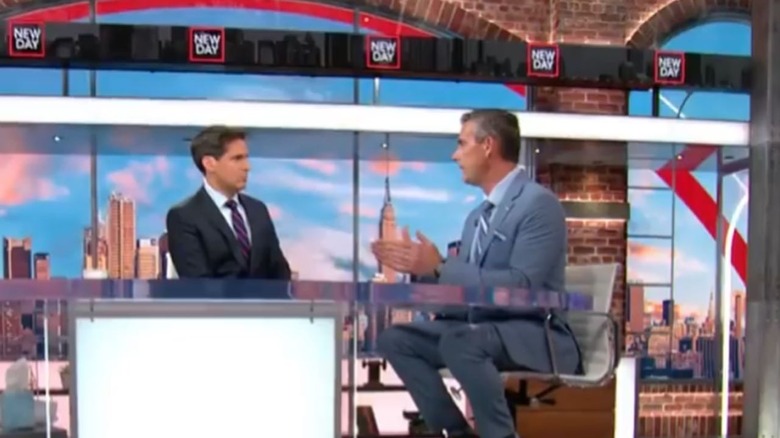
Why do you think that fans are so critical of elite athletes who speak out about their mental health struggles?
When it comes to fans, and the word “fanatic,” which is really kind of what it comes down to, a lot of sports, from the fan’s perspective, it’s a way for them to emote in our culture and society. It’s not socially appropriate or acceptable for us to really show strong emotion. But you can go to an athletic event and you can yell, you can holler, you can say things that are, in other situations … they might get you fired, or put in jail. And conversely, you can turn around and hug an absolute stranger that you don’t even know. But because they’re cheering for the same team you instantly have a bond of intimacy and friendship, because you just witnessed that same wonderful event.
And so when it comes to fans, fans and emotions go hand in hand. That’s the essence of being a fan. “This is my outlet, to let out tension, to let out emotions.” And sometimes the filter that each person has for those emotions, at times, might be compromised, and therefore more emotion gets out, and then we find ourselves in a difficult dilemma.
And how do you think that the media “selling the drama” — [another phrase you used in the documentary] — impacts the mental health of these athletes?
Well, it’s significant. I mean, in a culture and society where we’re often taught to “suck it up, bury the emotions, don’t whine, don’t complain,” when we see something on TV, in a film, that’s emotional, we connect with that. We resonate with that. We want to realize that we’re not alone, and that these people struggle or feel the same ways that we do. And so there’s essentially a piece of that that leads us to catharsis. A freeing of repressed emotion where we don’t have to bury it, because now we can understand that athletes either enabled me to yell and scream and shout in a positive or a negative way. And so, selling the drama. So we want to identify with our athletes and the actors that are emoting because it enables us to feel better about what’s going on in ourselves.
So when we talk about selling the drama, the positive excitement, I mean, that’s the good stuff we all want to identify with. But too often, selling the drama means we have to sell sadness, and defeat, and frustration, and agony. And life is emotional, and sports are emotional. And so when we capture that negative emotion, here’s why we like it: The one thing that you and I have in common with every person in the world is suffering. And so if I don’t know this culture, I don’t even speak their language, I can relate to the people there that are suffering. And so suffering is what we have in common. That’s negative emotion. And so when we sell the drama, we’re selling that connectivity, we’re selling that dynamic where it pulls us closer to another person because we connect, we understand suffering. So therein lies where, yes, on the backend, media’s going to make money. But we also benefit as fans and athletes because there’s some type of meaningful connection, too. So it works on a lot of levels at times.
Supporting the mental health of elite athletes
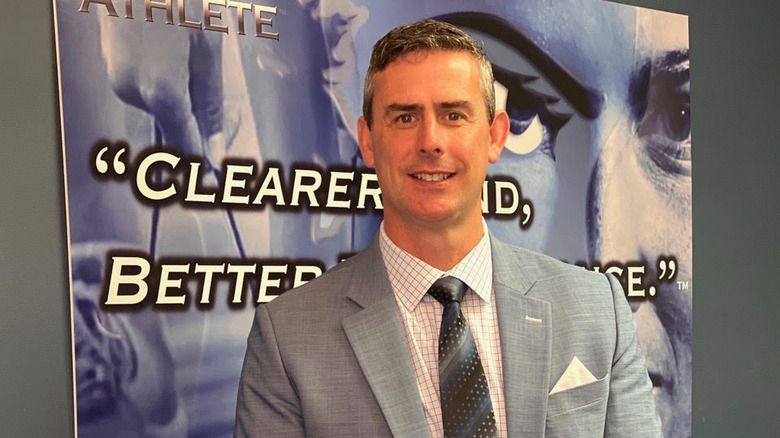
Abby Spencer
And sometimes we do see the opposite — fan support for these athletes. So how does that fan support help during mental health crises, sometimes? Like Simone Biles, for example, had a great outpouring of support along with the criticism.
Well, I think that when Naomi stepped down there was incredible support in the athletic world. And so in the athletic world everyone said, “It’s okay not to be okay. And we support Naomi.” And that was one of the first times I actually got to those high-level BBC and CNN kinds of interviews. And then, what I think that did, was that [Naomi stepping down] was the shot heard around sports.
But the shot heard around the world was Simone Biles, because everybody was watching the Olympics. And when that occurred, I think it really gave Simone the permission to know that, having seen what the sports world said for Naomi, that, “Okay, if I couldn’t do this and it wasn’t wise for my mental health and wellbeing,” that she too would find the support, and she did.
And that’s when I pretty much went on every network out there, because now the whole world was basically saying, “Hey, it’s okay not to be okay. We support you, too. And we understand, Simone, that it isn’t wise for you to try to do some of those really complicated skills if you’re not feeling at your best mentally.” And I’m really proud of her, because at that point in time, she made a statement, said, “Yeah, it’s not in my best interest right now. And my safety and wellbeing is more important.” And everybody said to her, “That’s cool.”
So support is really one of the best indicators of how a person responds from any trauma in life. And I think the stigma has fallen, and consequently people are finally supporting athletes, and everybody, when it comes to mental health.
How can we, as a society, be more supportive of the mental health of our athletes, who sometimes just become entertainment to us?
Well, one of the ways that we can support athletes with mental health, I’m obviously a little bit biased to “I’m Fine, (Not) Really.” Because if we could take “I’m Fine, (Not) Really” and we could show that and share that with so many athletes and coaches and parents and people in the world … If we could get a team to say, “Hey, let’s just take 45 minutes and let’s watch this film together,” that might transform the lives of so many people on that team and the interpersonal dynamics between them. So one way we can clearly do this is, we’ve got to take something like “I’m Fine, (Not) Really,” and we’ve got to put it in front of as many athletes as we possibly can and let them know they’re not alone.
Creating a better future for elite athletes
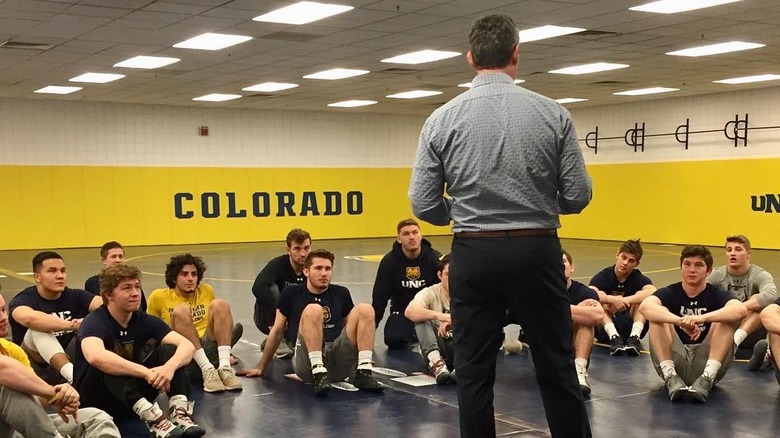
And what can happen when these elite athletes aren’t allowed to focus on their mental health?
Well, at it’s worst, it’s suicide. And the reason is because suicide is really about the word hope. When an individual takes their life … nobody wants to die, but they just don’t want to feel the way that they’re feeling, and they’ve lost hope that it’s going to change, that they’re going to get out of that feeling. And why this film, I find that really it’s so important, is because it gives individuals hope that there’s help. You see, if we understand that there’s help, there’s somebody out there like me, there’s some resource I could point to. If there’s help out there now there’s hope. And that’s really what we’re trying to instill in every person out there, including athletes, of course.
I love that. And last one for you: How do you think elite athletes talking about mental health is changing sports for future elite athletes?
Well, it’s really paving the way for more sports psychologists and mental healthcare professionals to begin to provide their services at a younger age and let those young people come up and say, “Okay, I’ve got skills to manage performance anxiety a little bit better.” Now, sometimes in the past, pro athletes came into the pressure cooker and they never really had that type of training. Now we’re seeing the mental skills training at the high school level, at the collegiate level, and so before they maybe get to their biggest stage, they’re now, and in the future, going to be bringing with them a mental toolbox to help equip them for the mental health [struggles] and the pressure cooker that they’re going to face.
If you or anyone you know is having suicidal thoughts, please call the National Suicide Prevention Lifeline at 1-800-273-TALK (8255).
Find your local station listings and airtimes for “I’m Fine, (Not) Really” at imfinenotreally.com. You can also visit mondocares.com to keep up with current initiatives, and follow them on Instagram at @MondoSportUSA and @MondoCares, and on Twitter at @mondocares.

